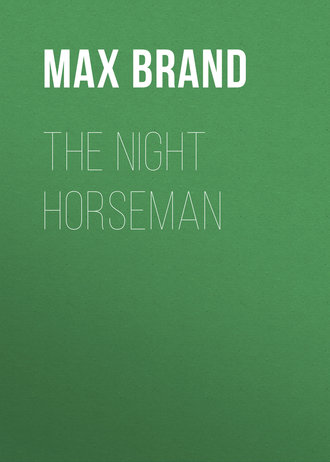
Макс Брэнд
The Night Horseman
CHAPTER XLI
THE FALLING OF NIGHT
It had been hard to gauge the falling of night on this day, and even the careful eyes of the watchers on the Cumberland Ranch could not tell when the greyness of the sky was being darkened by the coming of the evening. All day there had been swift alterations of light and shadow, comparatively speaking, as the clouds grew thin or thick before the wind. But at length, indubitably, the night was there. Little by little the sky was overcast, and even the lines of the falling rain were no longer visible. Before the gloom of the darkness had fully settled over the earth, moreover, there came a change in the wind, and the watchers at the rain-beaten windows of the ranch-house saw the clouds roll apart and split into fragments that were driven from the face of the sky; and from the clean washed face of heaven the stars shone down bright and serene. And still Dan Barry had not come.
After the tumult of that long day the sudden silence of that windless night had more ill omen in it than thunder and lightning. For there is something watching and waiting in silence. In the living room the three did not speak.
Now that the storm was gone they had allowed the fire to fall away until the hearth showed merely fragmentary dances of flame and a wide bed of dull red coals growing dimmer from moment to moment. Wung Lu had brought in a lamp—a large lamp with a circular wick that cast a bright, white light—but Kate had turned down the wick, and now it made only a brief circle of yellow in one corner of the room. The main illumination came from the fireplace and struck on the faces of Kate and Buck Daniels, while Joe Cumberland, on the couch at the end of the room, was only plainly visible when there was an extraordinarily high leap of the dying flames; but usually his face was merely a glimmering hint in the darkness—his face and the long hands which were folded upon his breast. Often when the flames leapt there was a crackling of the embers and the last of the log, and then the two nearer the fire would start and flash a glance, of one accord, towards the prostrate figure on the couch.
That silence had lasted so long that when at length the dull voice of Joe Cumberland broke in, there was a ring of a most prophetic solemnity about it.
"He ain't come," said the old man. "Dan ain't here."
The others exchanged glances, but the eyes of Kate dropped sadly and fastened again upon the hearth.
Buck Daniels cleared his throat like an orator.
"Nobody but a fool," he said, "would have started out of Elkhead in a storm like this."
"Weather makes no difference to Dan," said Joe Cumberland.
"But he'd think of his hoss–"
"Weather makes no difference to Satan," answered the faint, oracular voice of Joe Cumberland. "Kate!"
"Yes?"
"Is he comin'?"
She did not answer. Instead, she got up slowly from her place by the fire and took another chair, far away in the gloom, where hardly a glimmer of light reached to her and there she let her head rest, as if exhausted, against the back of the seat.
"He promised," said Buck Daniels, striving desperately to keep his voice cheerful, "and he never busts his promises."
"Ay," said the old man, "he promised to be back—but he ain't here."
"If he started after the storm," said Buck Daniels.
"He didn't start after the storm," announced the oracle. "He was out in it."
"What was that," cried Buck Daniels sharply.
"The wind," said Kate, "for it's rising. It will be a cold night, to-night."
"And he ain't here," said the old man monotonously.
"Ain't there things that might hold him up?" asked Buck, with a touch of irritation.
"Ay," said the old rancher, "they's things that'll hold him up. They's things that'll turn a dog wild, too, and the taste of blood is one of 'em!"
The silence fell again.
There was an old clock standing against the wall. It was one of those tall, wooden frames in which, behind the glass, the heavy, polished disk of the pendulum, alternated slowly back and forth with wearisome precision. And with every stroke of the seconds there was a faint, metallic clangor in the clock—a falter like that which comes in the voice of a very old man. And the sound of this clock took possession of every silence until it seemed like the voice of a doomsman counting off the seconds. Ay, everyone in the room, again and again, took up the tale of those seconds and would count them slowly—fifty, fifty-one, fifty-two, fifty-three—and on and on, waiting for the next speech, or for the next popping of the wood upon the hearth, or for the next wail of the wind that would break upon the deadly expectancy of that count. And while they counted each looked straight before him with wide and widening eyes.
Into one of these pauses the voice of Buck Daniels broke at length; and it was a cheerless and lonely voice in that large room, in the dull darkness, and the duller lights.
"D'you remember Shorty Martin, Kate?"
"I remember him."
He turned in his chair and hitched it a little closer to her until he could make put her face, dimly, among the shadows. The flames jumped on the hearth, and he saw a picture that knocked at his heart.
"The little bow-legged feller, I mean."
"Yes, I remember him very well."
Once more the flames sputtered and he saw how she looked wistfully before her and above. She had never seemed so lovely to Buck Daniels. She was pale, indeed, but there was no ugly pinching of her face, and if there were shadows beneath her eyes, they only served to make her eyes seem marvelously large and bright. She was pallid, and the firelight stained her skin with touches of tropic gold, and cast a halo of the golden hair about her face. She seemed like one of those statues wrought in the glory and the rich days of Athens in ivory and in gold—some goddess who has heard the tidings of the coming fall, the change of the old order, and sits passive in her throne waiting the doom from which there is no escape. Something of this filtered through to the sad heart of Buck Daniels. He, too, had no hope—nay, he had not even her small hope, but somehow he was able to pity her and cherish the picture of her in that gloomy place. It seemed to Buck Daniels that he would give ten years from the best of his life to see her smile as he had once seen her in those old, bright days. He went on with his tale.
"You would have busted laughin' if you'd seen him at the Circle Y Bar roundup the way I seen him. Shorty ain't so bad with a rope. He's always talkin' about what he can do and how he can daub a rope on anything that's got horns. He ain't so bad, but then he ain't so good, either. Specially, he ain't so good at ridin'—you know what bowed legs he's got, Kate?"
"I remember, Buck."
She was looking at him, at last, and he talked eagerly to turn that look into a smile.
"Well, they was the three of us got after one two year old—a bull and a bad 'un. Shorty was on one side and me and Cuttle was on the other side. Shorty daubed his rope and made a fair catch, but when his hoss set back the rope busted plumb in two. Now, Shorty, he had an idea that he could ease the work of his hoss a whole pile if he laid holts on the rope whenever his hoss set down to flop a cow. So Shorty, he had holt on this rope and was pulling back hard when the rope busted, and Shorty, he spilled backwards out'n that saddle like he'd been kicked out.
"Whilst he was lyin' there, the bull, that had took a header when the rope busted, come up on his feet agin, and I'll tell a man he was rarin' mad! He seen Shorty lyin' on the ground, and he took a run for Shorty. Me and Cuttle was laughin' so hard we couldn't barely swing our ropes, but I made a throw and managed to get that bull around both horns. So my Betty sits down and braces herself for the tug.
"In the meantime little Shorty, he sits up and lays a hand to his head, and same time he sees that bull come tarin' for him. Up he jumps. And jest then the bull come to the end of the line and wonk!—down he goes, head over heels, and hits the sand with a bang that must of jostled his liver some, I'll be sayin'!
"Well, Shorty, he seen that bull fly up into the air and he lets out a yell like the world was comin' to an end, and starts runnin'. If he'd run straight back the other way the bull couldn't of run a step, because I had him fast with my rope, but Shorty seen me, and he come tarin' for my hoss to get behind him.
"That bull was like a cat gettin' to his feet, and he sights Shorty tarin' and lights out after him. There they went lickety-split. That bull was puffin' on the seat of Shorty's trowsers and tossin' his horns and jest missin' Shorty by inches; and Shorty had his mouth so wide open hollerin' that you could have throwed a side of beef down his throat; and his eyes was buggin' out. Them bow-legs of his was stretchin' ten yards at a clip, most like, and the boys says they could hear him hollerin' a mile away. But that bull, stretch himself all he could, couldn't gain an inch on Shorty, and Shorty couldn't gain an inch on the bull, till the bull come to the other end of the forty-foot rope, and then, whang! up goes the heels of the bull and down goes his head, and his heels comes over—wonk! and hits Shorty right square on the head.
"Been an ordinary feller, and he wouldn't of lived to talk about it afterwards, but seein' it was Shorty, he jest goes up in the air and lands about ten yards away, and rolls over and hits his feet without once gettin' off his stride—and then he did start runnin', and he didn't stop runnin' nor hollerin' till he got plumb back to the house!"
Buck Daniels sat back in his chair and guffawed at the memory. In the excitement of the tale he had quite forgotten Kate, but when he remembered her, she sat with her head craned a little to one side, her hand raised for silence, and a smile, indeed, upon her lips, but never a glance for Buck Daniels. He knew at once.
"Is it him?" he whispered. "D'you hear him?"
"Hush!" commanded two voices, and then he saw that old Joe Cumberland also was listening.
"No," said the girl suddenly, "it was only the wind."
As if in answer, a far, faint whistling broke upon them. She drew her hands slowly towards her breast, as if, indeed, she drew the sound in with them.
"He's coming!" she cried. "Oh, Dad, listen! Don't you hear?"
"I do," answered the rancher, "but what I'm hearin' don't warm my blood none. Kate, if you're wise you'll get up and go to your room and don't pay no heed to anything you might be hearin' to-night."
CHAPTER XLII
THE JOURNEY INTO NIGHT
There was no doubting the meaning of Joe Cumberland. It grew upon them with amazing swiftness, as if the black stallion were racing upon the house at a swift gallop, and the whistling rose and rang and soared in a wild outburst. Give the eagle the throat of the lark, and after he has struck down his prey in the centre of the sky and sent the ragged feathers and the slain body falling down to earth, what would be the song of the eagle rising again and dwindling out of sight in the heart of the sky? What terrible pean would he send whistling down to the dull earth far below? And such was the music that came before the coming of Dan Barry. It did not cease, as usual, at a distance, but it came closer and closer, and it swelled around them. Buck Daniels had risen from his chair and stolen to a corner of the room where not a solitary shaft of light could possibly reach him; and Kate Cumberland slipped farther into the depths of the big chair.
So that, in their utter silence, in spite of the whistling that blew in upon them, they could hear the dull ticking of the tall clock, and by a wretched freak of fate the ticking fell exactly in with the soaring rhythm of the whistle and each had a part in the deadliness of the other.
Very near upon them the music ceased abruptly. A footfall swept down the hall, a weight struck the door and cast it wide, and Black Bart glided into the room. He cast not a glance on either side. He turned his head neither to right nor to left. But he held straight on until he came to Kate Cumberland and there he stood before her.
She leaned forward.
"Bart!" she said softly and stretched out her hands to him.
A deep snarl stopped the gesture, and at the flash of the long fangs she sank into the chair. Old Joe Cumberland, with fearful labour, dragged himself to a sitting position upon the couch, and sitting up in this fashion the light fell fully upon his white face and his white hair and his white beard, so that he made a ghostly picture.
Then an outer door slammed and a light step, at an almost running pace speeded down the hall, the door was swung wide again, and Dan was before them. He seemed to bring with him the keen, fresh air of the light, and at the opening of the door the flame in the lamp jumped in its chimney, shook, and fell slowly back to its original dimness; but by that glow of light they saw that the sombrero upon Dan Barry's head was a shapeless mass—his bandana had been torn away, leaving his throat bare—his slicker was a mass of rents and at the neck had been crumpled and torn in a thousand places as though strong teeth had worried it to a rag. Spots of mud were everywhere on his boots, even on his sombrero with its sagging brim, and on one side of his face there was a darker stain. He had ceased his whistling, indeed, but now he stood at the door and hummed as he gazed about the room. Straight to Kate Cumberland he walked, took her hands, and raised her from the chair.
He said, and there was a fibre and ring in his voice that made them catch their breaths: "There's something outside that I'm following to-night. I don't know what it is. It is the taste of the wind and the feel of the air and the smell of the ground. And I've got to be ridin'. I'm saying good-bye for a bit, Kate."
"Dan," she cried, "what's happened? What's on your face?"
"The mark of the night," he answered. "I don't know what else. Will you come with me, Kate?"
"For how long? Where are you going, Dan!"
"I don't know where or how long. All I know is I've got to be going. Come to the window. Take the air on your face. You'll understand!"
He drew her after him and cast up the window.
"Do you feel it in the wind" he called to her, turning with a transfigured face. "Do you hear it?"
She could not speak but stood with her face lifted, trembling.
"Look at me!" he commanded, and turned her roughly towards him. There he stood leaning close to her, and the yellow light flickered and waned and burned again in his eyes.
He had held her hands while he stared. Now he dropped them with an exclamation.
"You're blank," he said angrily. "You've seen nothing and heard nothing."
He turned on his heel.
"Bart!" he called, and walked from the room, and they heard the padding of his soft step down the hall and on the porch and then—silence.
Black Bart slunk to the door and into the hall, but instantly he was back and peering into the gloom of the silent place like an evil-eyed spectre.
A sharp whistle rang from outside, and Black Bart started. Still he glided on until he stood before Kate; then turned and stalked slowly towards the door, looking back after her. She did not move, and with a snarl the wolf-dog whirled again and trotted back to her. This time he caught a fold of her skirt in his teeth and pulled on it. And under the pressure she made a step.
"Kate!" called Joe Cumberland. "Are you mad, girl, to dream of goin' out in a night like this?"
"I'm not going!" she answered hurriedly. "I'm afraid—and I won't leave you, Dad!"
She had stopped as she spoke, but Black Bart, snarling terribly, threw his weight back, and dragged her a step forward.
"Buck," cried old Joe Cumberland and he dragged himself up and stood tottering. "Shoot the damned wolf—for God's sake—for my sake!"
Still the wolf-dog drew the girl in that snarling progress towards the door.
"Kate!" cried her father, and the agony in his voice made it young and sent it ringing through the room. "Will you go out to wander between heaven and hell—on a night like this?"
"I'm not going!" she answered, "I won't leave you—but oh—Dad!–"
He opened his lips for a fresh appeal, but the chorus of the wild geese swept in upon the wind, blown loud and clear and jangling as distant bells out of tune. And Kate Cumberland buried her face in her hands and stumbled blindly out of the room and down the hall—and then they heard the wild neighing of a horse outside.
"Buck!" commanded Joe Cumberland. "He's stealin' my girl—my Kate—go out! call up the boys—tell'em to stop Dan from saddlin' a horse for Kate–"
"Wait and listen!" cut in Buck Daniels. "D'you hear that?"
On the wet ground outside they heard a patter of galloping hoofs, and then a wild whistling, sweet and keen and high, came ringing back to them. It diminished rapidly with the distance.
"He's carryin' her off on Satan!" groaned Joe Cumberland, staggering as he tried to step forward. "Buck, call out the boys. Even Satan can't beat my hosses when he's carryin' double—call'em out—if you bring her back–"
His voice choked and he stumbled and would have fallen to his knees had not Buck Daniels sprang forward and caught him and carried him back to the couch.
"What's happened there ain't no man can stop," said Buck hoarsely. "God's work or devil's work—I dunno—but I know there ain't no place for a man between Dan and Kate."
"Turn up the lights," commanded Joe Cumberland sharply. "Got to see; I got to think. D'you hear?"
Buck Daniels ran to the big lamp and turned up the wick. At once a clear light flooded every nook of the big room and showed all its emptiness.
"Can't you make the lamp work?" asked the old ranchman angrily. "Ain't they any oil in it? Why, Buck, they ain't enough light for me to see your face, hardly. But I'll do without the light. Buck, how far will they go? Kate's a good girl! She won't leave me, lad!"
"She won't," agreed Buck Daniels. "Jest gone with Dan for a bit of a canter."
"The devil was come back in his eyes," muttered the old man. "God knows where he's headin' for! Buck, I brought him in off'n the range and made him a part of my house. I took him into my heart; and now he's gone out again and taken everything that I love along with him. Buck, why did he go?"
"He'll come back," said the big cowpuncher softly.
"It's gettin' darker and darker," said Joe Cumberland, "and they's a kind of ringing in my ears. Talk louder. I don't hear you none too well."
"I said they was comin' back," said Buck Daniels.
Something like a light showed on the face of Joe Cumberland.
"Ay, lad," he said eagerly, "I can hear Dan's whistlin' comin' back—nearer and nearer. Most like he was jest playin' a joke on me, eh, Buck?"
"Most like," said Buck, brokenly.
"Ay, there it's ringin' at the door of the house! Was that a footstep on the hall?"
"It was," said Buck. "They's comin' down the hall!"
But far, far away he heard the whistling of Dan Barry dying among the hills.
"You let the lamp go out," said Joe Cumberland, "and now I can't see nothing. Are they in the room?"
"They're here," said Buck Daniels, "comin' towards you now."
"Dan!" cried the old man, shading his eyes and peering anxiously—"no, I can't see a thing. Can you find me, lad?"
And Buck Daniels, softening his voice as much as he could, answered. "I can find you."
"Then gimme your hand."
Buck Daniels slipped his own large hand into the cold fingers of the dying cattleman. An expression of surpassing joy lay on the face of Joe Cumberland.
"Whistlin' Dan, my Dan," he murmured faintly, "I'm kind of sleepy, but before I go to sleep, to-night, I got to tell you that I forgive you for your joke—pretendin' to take Kate away."
"They's nothin' but sleep worth while—and goin' to sleep, holdin' your hand, lad—"
Buck Daniels dropped upon his knees and stared into the wide, dead eyes. Through the open window a sound of whistling blew to him. It was a sweet, faint music, and being so light it seemed like a chorus of singing voices among the mountains, for it was as pure and as sharp as the starlight.
Buck Daniels lifted his head to listen, but the sound faded, and the murmur of the night-wind came between.






